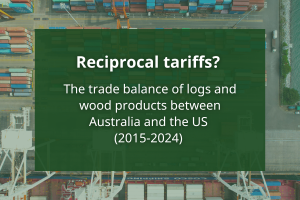The forest industry in Australia contributes to jobs and economic activity in multiple regional communities. This contribution results from the growing, management and harvesting of plantations and native forests, and processing of harvested wood.
In 2017, Forest and Wood Products Australia engaged the University of Canberra, working with BDO EconSearch, to provide a socio-economic assessment of the forest industry in Western Australia for the financial year of 2015/16 (Schirmer et al. 2017). This report provides updated economic contributions for the 2019/20 financial year. This study presents findings for the forest industry in Western Australia (WA) and WA forestry regions, and includes activity dependent on the harvest of timber from softwood plantation, hardwood plantation and native forests. It does not examine sandalwood production.
In 2019-20, the direct value of output generated by the WA forest industry at the point of sale of primary processed products was $663 million, increasing to $1,331 million when flow-on effects generated in other industries as a result of spending by the forest industry are included. This total included $235 million dependent on native forests, $543 million dependent on softwood plantation and $553 million dependent on hardwood plantations.
However, value of output is not always a good indicator of the industry’s overall contribution to the local economy, as it does not identify the extent to which the economy of a given region benefited from the industry’s activity in the form of returns to business owners, wages and salaries, and taxes. Measuring the industry’s contribution to Gross State Product (GSP – the state equivalent of Gross Domestic Product) helps address this. In 2019-20, the forest industry directly contributed around $279 million to GSP in WA, and a total of $655 million once flow-on effects through the entire economy were included. This total included $116 million dependent on native forests, $278 million dependent on softwood plantation and $261 million dependent on hardwood plantations.
The forest industry in WA generated a total of 1,960 direct full time equivalent (fte) jobs in 2019-20, increasing to 4,657 fte jobs once flow-on effects through the entire economy were included. Up to the point of primary processing, a total of 1,015 fte jobs were generated by the native forest industry, 1,916 by softwood plantations, and 1,727 by hardwood plantations grown in WA.
In terms of total number of jobs, the forest industry in WA generated 2,134 direct jobs in 2019-20, increasing to 4,941 jobs once flow-on effects through the entire economy were included. Up to the point of primary processing, a total of 1,062 jobs were generated by the native forest industry, 2,059 by softwood plantations, and 1,820 by hardwood plantations grown in WA.
This is summarised in the following table.




